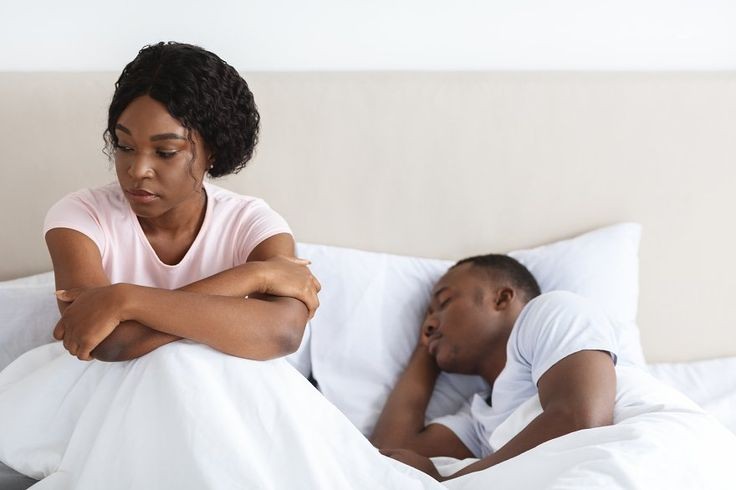Lifestyle
Connection Between Sex and Mental Health

There is a deep connection between sex and mental health and why it’s not just about the orgasm sex isn’t just a physical act.
It’s tangled up with our emotions, our self-worth, and even our mental well-being. Whether you’re having it regularly, not at all, or somewhere in between, sex (or the lack of it) plays a bigger role in your mental health than you might think.
1. Sex as a Mood Booster (Thanks to Science!)
Ever noticed how a good romp in the sheets can make stress melt away? That’s not just in your head, literally. Sex releases a cocktail of feel-good chemicals:
– Oxytocin (the cuddle hormone) promotes bonding and reduces anxiety.
– Endorphins act like natural painkillers and stress relievers.
– Dopamine gives you that euphoric, “I’m on top of the world” feeling.
It’s like nature’s antidepressant, no prescription needed. But here’s the catch: it only works when the sex is good and consensual. Bad or forced sex? That can do the exact opposite.

2. When Sex is Missing: The Frustration Factor
Dry spells happen, life gets busy, relationships hit rough patches, or maybe you’re just not feeling it. But when sex disappears for too long, it can mess with your head:
– Self-esteem takes a hit (“Am I unattractive?”)
– Anxiety creeps in (“Is something wrong with me?”)
– Resentment builds (especially in relationships where one person wants it more)
It’s not just about “getting some.” It’s about feeling desired, connected, and alive.

3. Bad Sex vs. Good Sex: The Mental Health Divide
Not all sex is created equal. Great sex can make you feel invincible. Bad sex (or worse, obligation sex) can leave you feeling empty, used, or even ashamed.
– Good sex = mutual pleasure, communication, presence.
– Bad sex = performance pressure, disconnection, regret.
If sex leaves you feeling worse afterward, it’s worth asking why. Are you doing it for yourself, or for someone else’s approval?

4. The Dark Side: When Sex Hurts Instead of Heals
For some, sex isn’t a happy topic. Trauma, dysfunction, or past abuse can turn intimacy into a minefield. If sex triggers anxiety, shame, or panic, therapy (especially with a sex-positive counselor) can help rebuild a healthier relationship with it.
5. What If You’re Just Not Into It?
And that’s completely okay. Asexuality, low libido (thanks to stress!), or just personal preference, you don’t need sex to be mentally healthy. What matters is honesty with yourself and your partner(s).

Read Also: Sex and Relationships: Effective Ways to Deliver Criticism to Your Partner Without Causing Conflict
Sex is Mental, Not Just Physical, your brain is your biggest sex organ. If your mental health is struggling, your sex life will reflect that. And if your sex life is off, your mood will too. The key? Don’t ignore it.
Talk about it, explore it, and above all make sure it’s serving you, not hurting you.
So… how’s your relationship with sex these days? (No judgment here.)
Lifestyle
Abuja’s 6 Classic Restaurants Worth Visiting

Abuja’s restaurant culture has expanded over the past decade, shaped by a growing professional population and dining habits that prioritise repeatable quality. While new venues continue to appear across the city, only a few become regular choices rather than occasional stops. The restaurants on this list have continued to attract regular diners by limiting their menus to well-defined offerings and maintaining consistent food quality and service. Located across Wuse 2, Maitama, Mabushi and Gwarinpa, they reflect a range of cuisines and dining formats, with a shared emphasis on consistent execution. Their continued relevance is driven less by visibility or short-term trends and more by repeat patronage, making them regular reference points within Abuja’s everyday dining landscape.
Wakkis Food – Indian Cuisine with Depth
171 Aminu Kano Crescent, Wuse 2, Abuja

Photo Credit – Google
Wakkis Food remains one of Abuja’s most dependable options for Indian cuisine. Located in Wuse 2, the restaurant focuses on well-established Indian dishes prepared with proper spice balance and technique. Meals such as biryani, kaathi rolls and tandoori selections are robust, reflecting a kitchen that prioritises accuracy over adaptation.
The space itself is simple and functional, which suits its core audience: diners who value flavour and portion consistency. It works equally well for weekday lunches and relaxed dinners, making it a regular stop for both locals and visitors seeking familiar Indian staples.
Tulip Bistro – Refined Dining in Wuse 2
Sunset Place, Wuse 2, Abuja

Photo Credit – Google
Tulip Bistro has positioned itself as a refined but accessible dining option within Wuse 2. Its menu leans towards continental and European-style dishes, presented with attention to balance and presentation. The restaurant’s interior supports quieter dining, making it suitable for conversations that require privacy without formality.
Rather than chasing trends, Tulip Bistro maintains a steady approach to its offerings. This has helped it retain a loyal customer base drawn to its calm atmosphere and dependable service, particularly for evening meals and business-related dining.
Woks & Koi – Contemporary Asian Dining
18 Durban Street, Wuse 2, Abuja

Photo Credit – Google
Woks & Koi offers a contemporary take on Asian cuisine, with a menu that spans Chinese and broader Pan-Asian influences. Its appeal lies in the combination of structured plating, controlled flavours and a modern dining environment that feels deliberate rather than decorative.
The restaurant is often chosen for group dinners and formal entertaining, largely due to its consistent service and menu variety. While individual dish preferences may differ, Woks & Koi maintains a reputation for reliability within Abuja’s Asian dining space.
Chopsticks – A Maitama Staple
52 Mississippi Street, Maitama, Abuja

Photo Credit – Google
Chopsticks has long been part of Abuja’s restaurant landscape, particularly in Maitama. Its menu focuses on classic Chinese dishes served in generous portions, appealing to diners who favour familiar flavours prepared without excessive modification.
The restaurant’s longevity is tied to its straightforward approach: predictable service, established recipes and a relaxed setting. It continues to attract families and regular patrons who prioritise comfort and consistency over experimentation.
BluCabana – A Destination Dining Experience
1322 Shehu Yar’Adua Way, Mabushi, Abuja

Photo Credit – Google
BluCabana operates as more than a conventional restaurant. With its expansive layout and outdoor seating, it offers a setting that encourages extended visits rather than quick meals. The menu spans Mediterranean, Middle Eastern and international dishes, giving diners flexibility without feeling unfocused.
Its appeal lies in the overall environment. Whether for weekend lunches or evening dinners, BluCabana accommodates varied dining needs while maintaining a calm, well-managed atmosphere that separates it from smaller, enclosed venues.
Crush Cafe – Gwarinpa’s Social Anchor
55 1st Avenue, Gwarinpa Estate, Abuja

Photo Credit – Google
Crush Cafe functions as both a restaurant and a social meeting point within Gwarinpa. Its menu covers breakfast options, grills and casual meals, allowing it to remain active throughout the day. The venue is particularly popular for informal gatherings, sports viewing and relaxed evenings.
Rather than relying solely on food, Crush Cafe benefits from its layout and programming, which encourages repeat visits. It remains one of the area’s most recognisable spots for casual dining combined with a lively but controlled atmosphere.
Final Note
These restaurants continue to attract steady patronage because they prioritise consistency in food quality, service delivery and atmosphere. In a city where new dining spots appear frequently, their ability to remain relevant reflects clear positioning and sustained standards rather than short-term appeal.
Sex & Relashionships
‘Future Faking’ Is the Dating Red Flag You Can’t Ignore

In today’s dating culture, conversations about the future often start early. Someone talks about marriage within weeks, mentions introducing you to their family, or casually includes you in plans that stretch years ahead. On the surface, it can feel reassuring. In reality, this pattern has a name, and it rarely leads where it claims to be going.
Future faking describes a situation where one partner speaks confidently about long-term plans without taking any steps to make those plans real. The promises sound specific enough to feel sincere, yet nothing in the present changes. There is no progress, no clarity, and no movement beyond conversation. Over time, the future becomes a holding space rather than a destination.

Photo Credit – Google
What makes future faking difficult to identify is that it often looks like commitment. The language is intentional. The confidence is convincing. But commitment shows up in behaviour, not projections. Someone who genuinely plans a future begins to align their choices with it. They create timelines, address obstacles, and make decisions that affect both people, not just the person being reassured.
In many dating situations, especially where expectations around marriage and stability are culturally significant, future faking can subtly extend relationships that are no longer growing. One partner remains emotionally invested, waiting for clear next steps that are repeatedly postponed. The other maintains closeness without accountability, often shifting the goalposts when questions become more direct.

Photo Credit – Google
This behaviour does not always come from malice. Some people enjoy the comfort of emotional security without the responsibility that commitment requires. Others are unsure of what they want but use future plans to avoid difficult conversations in the present. Regardless of intent, the effect is the same. Time passes, expectations deepen, and clarity never arrives.
A consistent sign of future faking is vagueness. Plans are described without dates. Decisions are delayed indefinitely. Conversations about progress are met with reassurance instead of action. When pressed, the future remains flexible, conditional, or dependent on circumstances that never seem to resolve.

Photo Credit – Google
Recognising future faking is not about distrusting optimism or shutting down conversations about what lies ahead. It is about paying attention to alignment. When words repeatedly outpace actions, the imbalance becomes information. Dating is not sustained by promises alone. It is sustained by evidence of shared direction.
In the end, the most reliable indicator of intent is not how vividly someone describes the future, but how seriously they engage with the present. Where effort is consistent, plans tend to follow. Where effort stalls, promises often replace progress.
Sex & Relashionships
Dating App Worth Swiping Right on in 2026

Online dating looks different in 2026. Swiping is no longer a pastime. For many, it has become a deliberate way to meet people who fit into real life. Whether the goal is romance, companionship, or something in between, expectations are clearer than they used to be.
Here is a look at the dating apps proving useful this year, based on how people are engaging with them in real life.
Tinder: Where Everyone Seems to Be

Photo Credit – Google
Tinder continues to dominate because of its sheer user base. In major cities, it is almost impossible not to find someone nearby.
The challenge lies in filtering profiles. While some users are serious about dating, others are only interested in casual chats or brief connections. Making Tinder work depends on being honest in your profile and clear in your conversations from the start.
Bumble: Women Call the Shots

Photo Credit – Google
Bumble stands out because it puts women in control of conversations. After a match is made, only women can initiate contact, which helps reduce unwanted messages.
The app goes beyond dating. It also allows users to build friendships or make professional connections. This flexibility makes it appealing to people juggling busy work and social schedules.
Badoo: Casual or Serious? You Decide

Photo Credit – Google
Badoo offers flexibility. Features such as “people nearby” and video chats make it easy to meet new people without much pressure.
The user base is mixed. Some are looking for meaningful relationships, while others prefer light conversations. Being selective and engaging thoughtfully improves the experience.
Apps Built with Local Culture in Mind

Photo Credit – Google
Alongside global platforms, locally focused apps are gaining attention. These services are designed with cultural context and communication habits in mind, making them easier to navigate and more practical for everyday use.
Location-based matching, profile verification, and fewer paywalls increase the chances of real-life meetings rather than endless online chatting.
A Quick Reality Check

Photo Credit – Google
No dating app is perfect. Fake profiles, unclear intentions, and ghosting still happen. What makes the difference is how the platform is used:
Be honest in your profile
Decide early whether you want friendship, casual dating, or a long-term relationship
Communicate clearly and respectfully
People who follow these basics tend to have better experiences, regardless of the app they choose.
Which App Should You Try?

Photo Credit – Google
Tinder: Best for a large pool of potential matches
Bumble: Ideal if you prefer women to initiate conversations
Badoo: Works for those open to both casual chats and serious connections
Local apps: Useful for features shaped around cultural familiarity and practical use
In 2026, dating apps are tools, not solutions on their own. The right choice depends on your goals, lifestyle, and level of intention. With patience and clarity, these platforms can still lead to meaningful connections. In a year where time feels increasingly limited, the right dating app is the one that respects it.
-

 Celebrity Style4 months ago
Celebrity Style4 months agoMercy Aigbe Keeps it Sharp in Ivory Dress
-

 Celebrity Style5 months ago
Celebrity Style5 months agoTwo Ways to Wear a Suit, According to Liquorose
-

 Celebrity Style4 months ago
Celebrity Style4 months agoBella Okagbue Puts a Spin on Feminine Suiting
-

 Fashion5 months ago
Fashion5 months agoBella Okagbue Clean London Look
-

 Fashion4 months ago
Fashion4 months agoTeminikan Experiments with Geometry in a Woven Mini
-

 Music5 months ago
Music5 months agoTiwa Savage Was in New York for Her Album Media Run
-

 Health5 months ago
Health5 months agoWhich Fruits Are Highest in Calcium?
-

 Lagos Fashion Week3 months ago
Lagos Fashion Week3 months agoLagos Fashion Week’s Earthshot Prize Win Highlights a Changing Direction in African Fashion Production
-

 Beauty5 months ago
Beauty5 months agoMust Adapt Beauty Routine for Woman Above 25
-

 Fashion5 months ago
Fashion5 months agoAmina Cocoa Just Made the Two-Piece Too Easy















